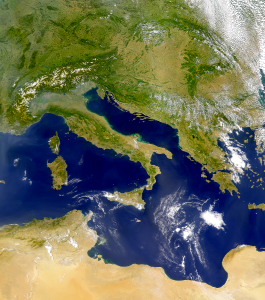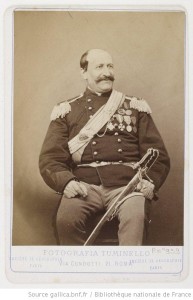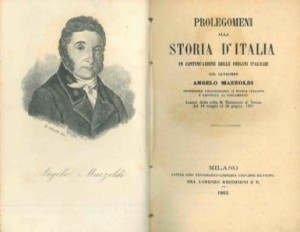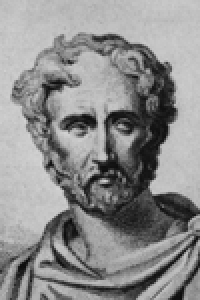Camillo Ravioli
Italy
Italy seems to have an uncertain etymology; Thucydides claims that Italos, the Sicilian king gave his name to Italy, while more recently Emilio Spedicato(h) considers that ”the best derivation we believe to be the one proposed by the Italian nuclear engineer Felice Vinci (1998), in his monograph claiming a Baltic setting for the Homeric epic: he derives Italia from the rare Greek word aithalia, meaning the smoking one.” This is thought to be a reference to Italy’s many volcanoes.
Italy today is comprised of territory south of the Alps on mainland Europe including a very large boot-shaped peninsula, plus Sicily, Sardinia and some smaller island groups, which along with the French island of Corsica virtually enclose the Tyrrhenian Sea.
The earliest proposal that Italy could be linked with Atlantis came from Angelo Mazzoldi in 1840 when he claimed that before Etruria, Italy had been home to Atlantis and dated its demise to 1986 BC. Mazzoldi expressed a form of hyperdiffusion that had his Italian Atlantis as the mother culture which seeded the great civilisations of the eastern Mediterranean region(b).
Some of Mazzoldi’s views regarding ancient Italy were expanded on by later scholars such as Camillo Ravioli, Ciro Nispi-Landi, Evelino Leonardi, Costantine Cattoi, Guido DiNardo and Giuseppe Brex. Ravioli sought to associate the Maltese island of Gozo with his proposed Atlantis in Italy.
The Italian region of Lazio, which includes Rome, has had a number of very ancient structures proposed as Atlantean; Monte Circeo (Leonardi) and Arpino(a) (Cassaro). Another aspect of Italian prehistory is the story of Tirrenide, which was described as a westward extension of the Italian landmass into the Tyrrhenian Sea during the last Ice Age, with a land bridge to a conjoined Sardinia and Corsica. At the same time, there were land links to Sicily and Malta, which were all destroyed as deglaciation took place and sea levels rose.
 It is surprising that so few researchers have commented on Italy’s part in Plato’s Atlantis narrative considering that he twice, without any ambiguity, informs us that the Atlantean domain extended as far as Tyrrhenia (modern Tuscany).
It is surprising that so few researchers have commented on Italy’s part in Plato’s Atlantis narrative considering that he twice, without any ambiguity, informs us that the Atlantean domain extended as far as Tyrrhenia (modern Tuscany).
Crit.114c. So all these, themselves and their descendants dwelt for many generations bearing rule over many other islands throughout the sea and holding sway besides, as was previously stated, over the Mediterranean peoples as far as Egypt and Tuscany. Tim.25a/b. Now in this island of Atlantis there existed a confederation of kings, of great and marvellous power, which held sway over all the island, and over many other islands also and parts of the continent; and, moreover, of the lands here within the Straits they ruled over Libya as far as Egypt, and over Europe as far as Tuscany. (Bury)
The quotation from Timaeus is most interesting because of its reference to a ‘continent’. Some have understandably but incorrectly claimed that this is a reference to America or Antarctica, when quite clearly it refers to southern Italy as part of the continent of Europe. Moreover, Herodotus is quite clear (4.42) that the ancient Greeks knew of only three continents, Europe, Asia and Libya.
Philo of Alexandria (20 BC-50 AD) in his On the Eternity of the World(g) wrote “Are you ignorant of the celebrated account which is given of that most sacred Sicilian strait, which in old times joined Sicily to the continent of Italy?” (v.139).>The name ‘Italy’ was normally used until the third century BC to describe just the southern part of the peninsula(e).<Some commentators think that Philo was quoting Theophrastus, Aristotle’s successor. This would push the custom of referring to Italy as a ‘continent’ back near to the time of Plato. More recently, Armin Wolf, the German historian, when writing about Scheria relates(f) that “Even today, when people from Sicily go to Calabria (southern Italy) they say they are going to the ‘continente’.” This continuing usage is further confirmed by a current travel site(d) and by author, Robert Fox[1168.141]. I suggest that Plato used the term in a similar fashion and can be seen as offering the most rational explanation for the use of the word ‘continent’ in Timaeus 25a.
When you consider that close to Italy are located the large islands of Sicily, Sardinia and Corsica, as well as smaller archipelagos such as the Egadi, Lipari and Maltese groups, the idea of Atlantis in the Central Mediterranean can be seen as highly compatible with Plato’s description.
If we accept that Plato stated unambiguously that the domain of Atlantis included at least part of southern Italy and also declared that Atlantis attacked from beyond the Pillars of Heracles, then this appellation could not be applied at that time to any location in the vicinity of the Strait of Gibraltar but must have been further east, probably not too far from Atlantean Italy. This matches earlier alternative locations recorded by classical writers who placed the ‘Pillars’ at the straits of Messina or Sicily. I personally favour Messina, unless there is stronger evidence that some of the islands in or near the Strait of Sicily such as the Maltese or Pelagian Islands or Pantelleria were home to the ‘Pillars’.
(a) http://www.richardcassaro.com/hidden-italy-the-forbidden-cyclopean-ruins-of-giants-from-atlantis
(b) Archive 2509P (Eng) Archive 2943 (Ital)
(c) Archive 2946
(d) Four Ways to Do Sicily – Articles – Departures (archive.org)
(e) https://profilbaru.com/article/Name_of_Italy *
(f) Wayback Machine (archive.org)
(g) http://www.earlychristianwritings.com/yonge/book35.html
(h) http://2010-q-conference.com/ophir/ophir-27-10-09.pdf
Ravioli, Camillo
 Camillo Ravioli (1820-1907) was the author of an 1859 monograph that was republished in 1998 as Prima Tellus- La dissertazione sulla Gigantèa dell’isola di Gozo[1061] which includes an introductory essay by Siro Tacito. Ravioli discusses Gozo and its relationship with an Italian Atlantis. He was obviously influenced by the better known Angelo Mazzoldi.
Camillo Ravioli (1820-1907) was the author of an 1859 monograph that was republished in 1998 as Prima Tellus- La dissertazione sulla Gigantèa dell’isola di Gozo[1061] which includes an introductory essay by Siro Tacito. Ravioli discusses Gozo and its relationship with an Italian Atlantis. He was obviously influenced by the better known Angelo Mazzoldi.
>Stel Pavlou‘s atlantipedia.com website, now offline, informed us that Ravioli “argued that Atlantis once spanned an area that included Gozo, Sardinia, Sicily and mainland Italy”.<
Mazzoldi, Angelo
Angelo Mazzoldi (1799-1864) was born in Montichiari, near Brescia in northern Italy. He studied law and also wrote on historical subjects.  His best known was published in Milan in 1840 with the snappy title of Delle origini italiche e della diffusione dell’incivilimento italiano all’Egitto, alla Fenicia, alla Grecia ea tutte le nazioni asiatiche poste sul Mediterraneo (Of the Italic origin and spread of civilization Italian Egypt, Phoenicia, Greece and all Asian nations located on the Mediterranean)(a) . This provoked a critical response from the journalist Aurelio Bianchi-Giovini (1799-1862) and a debate ensued over the following two years (c).
His best known was published in Milan in 1840 with the snappy title of Delle origini italiche e della diffusione dell’incivilimento italiano all’Egitto, alla Fenicia, alla Grecia ea tutte le nazioni asiatiche poste sul Mediterraneo (Of the Italic origin and spread of civilization Italian Egypt, Phoenicia, Greece and all Asian nations located on the Mediterranean)(a) . This provoked a critical response from the journalist Aurelio Bianchi-Giovini (1799-1862) and a debate ensued over the following two years (c).
Emiliana Pasca Noether in her Roots of Italian Nationalism 1700-1815[0958], recounts how Mazzoldi claimed that before Etruria, Italy had been home to Atlantis and dated its demise to 1986 BC and is recalled locally as the destruction of Tirrenide.
Similarly, Pierre Vidal-Naquet described Mazzoldi as having “carved out a place for Atlantis in the Italians’ own history”[0580]. Mazzoldi expressed a form of regional hyperdiffusion that had his Italian Atlantis as the mother-culture which seeded all the great civilisations of the eastern Mediterranean region.
Some of Mazzoldi’s views on ancient Italy were expanded on by later scholars such Camillo Ravioli, Ciro Nispi-Landi, Evelino Leonardi, Constantine Cattoi, Guido DiNardo and Giuseppe Brex (b).
(a) https://archive.org/details/delleoriginiita02mazzgoog
>(c) Archive 2509 (Eng) Archive 2943 (Ital)<
Pliny the Elder
Pliny the Elder (23 -79 AD), or more correctly Gaius Plinius Secundus, was a Roman writer and naturalist whose only extant work  is the 37 volume Historia Naturalis, considered to be the first encyclopaedia. It was Pliny the Elder who was credited with saying “that the only certainty is that nothing is certain.”
is the 37 volume Historia Naturalis, considered to be the first encyclopaedia. It was Pliny the Elder who was credited with saying “that the only certainty is that nothing is certain.”
Pliny makes a number of references to Atlantis that give us small clues to add to the writings of Plato. Jürgen Spanuth quotes Pliny where he recorded (vi.49) how in Sogdiana, in today’s Uzbekistan, there was reputed to have been an altar and ‘Pillars of Heracles’. Pliny also describes (vii.56) the encounter between the Athenians and Atlanteans as the first recorded battle. Interestingly he also refers to this conflict being fought with wooden sticks hardened by fire since they did not have iron. We can also infer from this comment that they did not have bronze either, thus setting the war in the Stone Age. Pliny’s comment would therefore place this event somewhere between 4000 BC and 2000 BC.
Anton Mifsud notes[209] how over the centuries various versions of Pliny’s text have been guilty of omissions and amendments. Pliny refers to Atlantis on a number of occasions but individual translations have omitted different references to ‘Atlantis’, ‘the islands of Atlantis’ and the Atlantic Sea. While it is accepted that Pliny’s writings do contain errors such arbitrary meddling with the text by translators does little to inspire confidence in the average reader!
Pliny in his remarks on the islands off the west coast of Africa notes that there was an island ‘off Mount Atlas’ called Atlantis (vi.36).
Intriguingly, Pliny describes Italy as being shaped like an oak leaf (iii.43), an image that inspired Camillo Ravioli to produce a matching speculative map of ancient Italy.
According to Pliny, Atlantians was the name that was applied to all Ethiopians including some known as White Ethiopians. In turn Ethiopians was a term applied to all Africans.
Pliny died, after being overcome by fumes, while trying to study the 79 AD eruption of Vesuvius.
